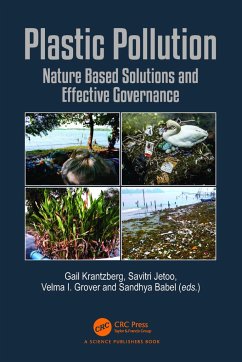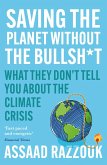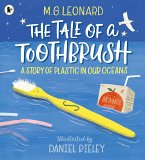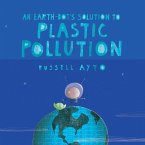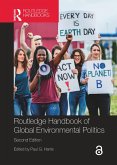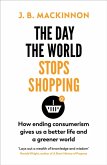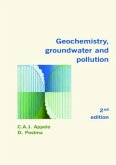Plastic Pollution
Nature Based Solutions and Effective Governance
Herausgeber: Krantzberg, Gail; Grover, Velma I; Jetoo, Savitri; Babel, Sandhya
Plastic Pollution
Nature Based Solutions and Effective Governance
Herausgeber: Krantzberg, Gail; Grover, Velma I; Jetoo, Savitri; Babel, Sandhya
- Gebundenes Buch
- Merkliste
- Auf die Merkliste
- Bewerten Bewerten
- Teilen
- Produkt teilen
- Produkterinnerung
- Produkterinnerung
The focus of this book is not just to highlight the problem of plastics, its definition, and how plastic pollution is impacting human health and environment but also to look at some best practices in both nature based solutions and in the field of law and policies.
Andere Kunden interessierten sich auch für
![Saving the Planet Without the Bullshit Saving the Planet Without the Bullshit]() Assaad RazzoukSaving the Planet Without the Bullshit9,99 €
Assaad RazzoukSaving the Planet Without the Bullshit9,99 €![The Tale of a Toothbrush: A Story of Plastic in Our Oceans The Tale of a Toothbrush: A Story of Plastic in Our Oceans]() M. G. LeonardThe Tale of a Toothbrush: A Story of Plastic in Our Oceans9,99 €
M. G. LeonardThe Tale of a Toothbrush: A Story of Plastic in Our Oceans9,99 €![The Crown The Crown]() Emily KapffThe Crown14,99 €
Emily KapffThe Crown14,99 €![An Earth-Bot's Solution to Plastic Pollution An Earth-Bot's Solution to Plastic Pollution]() Russell AytoAn Earth-Bot's Solution to Plastic Pollution15,99 €
Russell AytoAn Earth-Bot's Solution to Plastic Pollution15,99 €![Routledge Handbook of Global Environmental Politics Routledge Handbook of Global Environmental Politics]() Routledge Handbook of Global Environmental Politics195,99 €
Routledge Handbook of Global Environmental Politics195,99 €![The Day the World Stops Shopping The Day the World Stops Shopping]() J. B. MacKinnonThe Day the World Stops Shopping9,49 €
J. B. MacKinnonThe Day the World Stops Shopping9,49 €![Geochemistry, Groundwater and Pollution Geochemistry, Groundwater and Pollution]() C.A.J. AppeloGeochemistry, Groundwater and Pollution72,99 €
C.A.J. AppeloGeochemistry, Groundwater and Pollution72,99 €-
-
-
The focus of this book is not just to highlight the problem of plastics, its definition, and how plastic pollution is impacting human health and environment but also to look at some best practices in both nature based solutions and in the field of law and policies.
Produktdetails
- Produktdetails
- Water
- Verlag: Taylor & Francis Ltd
- Seitenzahl: 228
- Erscheinungstermin: 1. September 2023
- Englisch
- Abmessung: 237mm x 158mm x 17mm
- Gewicht: 536g
- ISBN-13: 9780367684808
- ISBN-10: 0367684802
- Artikelnr.: 68102491
- Water
- Verlag: Taylor & Francis Ltd
- Seitenzahl: 228
- Erscheinungstermin: 1. September 2023
- Englisch
- Abmessung: 237mm x 158mm x 17mm
- Gewicht: 536g
- ISBN-13: 9780367684808
- ISBN-10: 0367684802
- Artikelnr.: 68102491
Dr. Gail Krantzberg works at the interface of science and public policy with extensive expertise in disciplines involving remediation of degraded freshwater ecosystems, regeneration policies for natural ecosystem assets, and the advancement of Great Lakes resilience. She is Professor of the Masters of Engineering and Public Policy at McMaster University. She worked for the Ontario Ministry of Environment from 1988 to 2001 and was the director of the International Joint Commision's Great Lakes Regional Office from 2001-2005. Dr. Savitri Jetoo is an Adjunct Professor at Åbo Akademi University in Finland, whose work was recognised by the Baltic Sea Science Day Award. She obtained her undergraduate degree at the University of Queensland, Australia and her doctorate at McMaster University, Canada. She works at the interface of science and public policy with extensive expertise in water resources governance in many areas of the world where she lived and worked including the Great Lakes Region. Dr. Velma I. Grover has work experience spanning over two decades in international development with international policy think-tank, non-governmental sector, consulting and teaching at Universities (McMaster University and York University, Canada, and Kobe College, Japan). Her research interests include water, waste and impact of climate change on water cycle and health, and regeneration policies. She teaches at McMaster University in the 'Masters of Engineering and Public Policy' program. Dr. Sandhya Babel is a full professor at the School of Biochemical Engineering and Technology, Sirindhorn International Institute of Technology, Thammasat University, Thailand. Her main research focus has been on development of low-cost technolgies for the protection of environment. Specific research interests include microplastics pollution and uptake by biota, microbial fuel cells, adsorption, photocatalysis, phytoremediation, and membrane technology. She has been listed in the top 2% scientists in the world by Stanford University and Elsevier BV since 2020.
Plastics: Nature-Based Solutions and Effective Governance. Driver, Trends
and Fate of Plastics and Micro Plastics Occurrence in the Environment. The
Correlation Between Plastic and Climate Change. Plastics and Circular
Economy. Seeing Is Believing: Educational and Volunteer Programming to
Address Plastic Pollution in Hamilton Harbour. The Great Lakes Plastic
Cleanup: An Effective Approach to Addressing Plastic Pollution in the Great
Lakes. Microplastic Sources, Contamination, and Impacts on Aquaculture
Organisms. Occurrence and Source of Microplastics Contamination in Drinking
Water and Performance of Water Treatment Plants in Removing Microplastics.
Regulating the Export of Plastic Waste in Canada. Nature-Based Solutions to
Address the Plastics Problem: Biomimicry. Microplastic Research in India:
Current Status and Future Perspectives. Forging Plastic Litter Governance:
Addressing Acute Plastic Litter Pollution in Korea. The Role of
International Water Law in the Management of Marine Plastic Pollution: The
Case of China and Its Transboundary Rivers. The Plastic Vote: Referendum as
a Governance Tool to Combat Plastic Pollution. Plastic Pollution Treaty:
Way Forward.
and Fate of Plastics and Micro Plastics Occurrence in the Environment. The
Correlation Between Plastic and Climate Change. Plastics and Circular
Economy. Seeing Is Believing: Educational and Volunteer Programming to
Address Plastic Pollution in Hamilton Harbour. The Great Lakes Plastic
Cleanup: An Effective Approach to Addressing Plastic Pollution in the Great
Lakes. Microplastic Sources, Contamination, and Impacts on Aquaculture
Organisms. Occurrence and Source of Microplastics Contamination in Drinking
Water and Performance of Water Treatment Plants in Removing Microplastics.
Regulating the Export of Plastic Waste in Canada. Nature-Based Solutions to
Address the Plastics Problem: Biomimicry. Microplastic Research in India:
Current Status and Future Perspectives. Forging Plastic Litter Governance:
Addressing Acute Plastic Litter Pollution in Korea. The Role of
International Water Law in the Management of Marine Plastic Pollution: The
Case of China and Its Transboundary Rivers. The Plastic Vote: Referendum as
a Governance Tool to Combat Plastic Pollution. Plastic Pollution Treaty:
Way Forward.
Plastics: Nature-Based Solutions and Effective Governance. Driver, Trends
and Fate of Plastics and Micro Plastics Occurrence in the Environment. The
Correlation Between Plastic and Climate Change. Plastics and Circular
Economy. Seeing Is Believing: Educational and Volunteer Programming to
Address Plastic Pollution in Hamilton Harbour. The Great Lakes Plastic
Cleanup: An Effective Approach to Addressing Plastic Pollution in the Great
Lakes. Microplastic Sources, Contamination, and Impacts on Aquaculture
Organisms. Occurrence and Source of Microplastics Contamination in Drinking
Water and Performance of Water Treatment Plants in Removing Microplastics.
Regulating the Export of Plastic Waste in Canada. Nature-Based Solutions to
Address the Plastics Problem: Biomimicry. Microplastic Research in India:
Current Status and Future Perspectives. Forging Plastic Litter Governance:
Addressing Acute Plastic Litter Pollution in Korea. The Role of
International Water Law in the Management of Marine Plastic Pollution: The
Case of China and Its Transboundary Rivers. The Plastic Vote: Referendum as
a Governance Tool to Combat Plastic Pollution. Plastic Pollution Treaty:
Way Forward.
and Fate of Plastics and Micro Plastics Occurrence in the Environment. The
Correlation Between Plastic and Climate Change. Plastics and Circular
Economy. Seeing Is Believing: Educational and Volunteer Programming to
Address Plastic Pollution in Hamilton Harbour. The Great Lakes Plastic
Cleanup: An Effective Approach to Addressing Plastic Pollution in the Great
Lakes. Microplastic Sources, Contamination, and Impacts on Aquaculture
Organisms. Occurrence and Source of Microplastics Contamination in Drinking
Water and Performance of Water Treatment Plants in Removing Microplastics.
Regulating the Export of Plastic Waste in Canada. Nature-Based Solutions to
Address the Plastics Problem: Biomimicry. Microplastic Research in India:
Current Status and Future Perspectives. Forging Plastic Litter Governance:
Addressing Acute Plastic Litter Pollution in Korea. The Role of
International Water Law in the Management of Marine Plastic Pollution: The
Case of China and Its Transboundary Rivers. The Plastic Vote: Referendum as
a Governance Tool to Combat Plastic Pollution. Plastic Pollution Treaty:
Way Forward.

